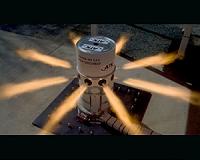 |
Washington DC (SPX) May 11, 2010 NASA-sponsored studies have found that omega-3 fatty acids found in fish oil may play a role in mitigating bone breakdown that occurs during spaceflight and in osteoporosis. Ongoing research for decades has looked for ways to stop bone density loss in astronauts. The solution could have significant implications for space travelers and those susceptible to bone loss on Earth. The studies' results are published in the May issue of the Journal of Bone and Mineral Research. The paper reports on four types of studies using cell culture, ground-based bed rest, and data from both space shuttle and International Space Station crew members. NASA studies bone density loss because it is one of the main effects of exposure to the weightlessness of space. Scientists hope to find ways to counteract the problem for astronauts on long-duration space voyages. In a series of cell-based studies, scientists documented that adding a specific omega-3 fatty acid to cells would inhibit the activation of factors that lead to bone breakdown. This was true in both typical cell cultures and those designed to mimic weightlessness. The inhibited factor is known as "nuclear factor kappa B" or NF?B. NF?B is involved in immune system behavior and the inflammation process. The activation of NF?B in different tissues can lead to bone and muscle loss. In a study of astronauts returning from short-duration shuttle missions, researchers found that NF?B activation was increased in blood cells collected at landing, and remained elevated for two weeks. These data provide evidence that inflammatory processes may be involved in some of the adaptation to microgravity and suggest that reducing NF?B activation could serve as a countermeasure to bone loss. A ground-based bed rest study was conducted on 16 subjects with the evaluations performed after 60 days. Bed rest simulates some of the effects of weightlessness, including muscle and bone loss. During the study, higher intake of omega-3 fatty acids was associated with less bone loss. Based on these studies, the investigators evaluated bone loss in astronauts and compared their findings to reported fish intake during spaceflight. Researchers found that astronauts who ate more fish lost less bone mineral after four-to-six-month spaceflights. Tracking fish consumption is not as accurate as determining exact diet and omega-3 fatty acid intake, but these data were not available. "These results are very exciting, and provide initial evidence that nutrition may be a key factor in mitigating bone loss in astronauts." said Scott Smith, a nutritionist at NASA's Johnson Space Center in Houston and one of the paper's authors. The studies were conducted by a team of scientists across multiple disciplines at Johnson. Smith and Sara Zwart lead the center's Nutritional Biochemistry Laboratory. Duane Pierson and Satish Mehta work for the Microbiology Laboratory and led the shuttle-based studies. Steve Gonda, a NASA scientist and a co-author, died before publication of the studies.
Share This Article With Planet Earth
Related Links View the paper on the Internet Space Tourism, Space Transport and Space Exploration News
 NASA Tests Orion Launch Abort System
NASA Tests Orion Launch Abort SystemWhite Sands Missile Range NM (SPX) May 10, 2010 NASA's Pad Abort 1 flight test, a launch of the abort system designed for the Orion crew vehicle, lifted off at 7 a.m. MDT Thursday at the U.S. Army's White Sands Missile Range (WSMR) near Las Cruces, N.M. The flight lasted about 135 seconds from launch until the crew module touchdown about a mile north of the launch pad. The flight was the first fully-integrated test of this launch abort ... read more |
|
| The content herein, unless otherwise known to be public domain, are Copyright 1995-2010 - SpaceDaily. AFP and UPI Wire Stories are copyright Agence France-Presse and United Press International. ESA Portal Reports are copyright European Space Agency. All NASA sourced material is public domain. Additional copyrights may apply in whole or part to other bona fide parties. Advertising does not imply endorsement,agreement or approval of any opinions, statements or information provided by SpaceDaily on any Web page published or hosted by SpaceDaily. Privacy Statement |